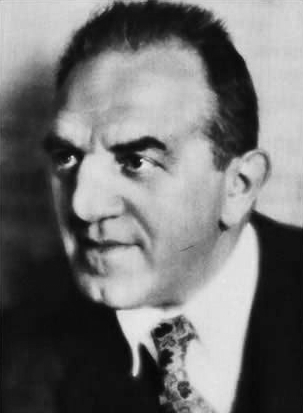
Louis Robert Wolheim was an American actor, of both stage and screen, whose rough physical appearance relegated him to roles mostly of thugs, villains and occasionally a soldier with a heart of gold in the movies, but whose talent allowed him to flourish on stage. His career was mostly contained during the silent era of the film industry, due to his death at the age of 50 in 1931.

Danger Lights is a 1930 American Pre-Code drama film, directed by George B. Seitz, from a screenplay by James Ashmore Creelman. It stars Louis Wolheim, Robert Armstrong, and Jean Arthur.
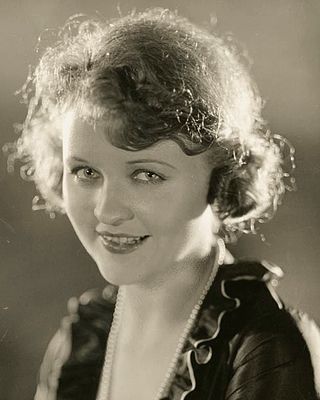
Phyllis Maude Haver was an American actress of the silent film era.
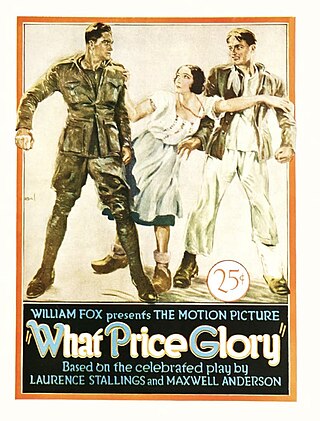
What Price Glory? is a 1926 American sound comedy-drama war film produced and distributed by Fox Film Corporation and directed by Raoul Walsh. The film was released with a synchronized musical score with sound effects using the Movietone sound system. The film is based on the 1924 play What Price Glory by Maxwell Anderson and Laurence Stallings and was remade in 1952 as What Price Glory starring James Cagney. Malcolm Stuart Boylan, founder of the U.S. Coast Guard Auxiliary, was title writer on the silent Fox attraction.

Tempest is a 1928 American sound drama film directed by Sam Taylor. While the film has no audible dialog, it was released with a synchronized musical score with sound effects using both the sound-on-disc and sound-on-film process. V. I. Nemirovich-Dantchenko wrote the screenplay and William Cameron Menzies won an Academy Award for Best Art Direction for his work in the film in 1929, the first year of the awards ceremony. John Barrymore and Camilla Horn star in the film, with Louis Wolheim co-starring.

The Awakening is a 1928 American sound feature film directed by Victor Fleming and starring Vilma Bánky. While the film has no audible dialog, it was released with a synchronized musical score with sound effects using both the sound-on-disc and sound-on-film process. The film was based on a story by Frances Marion.
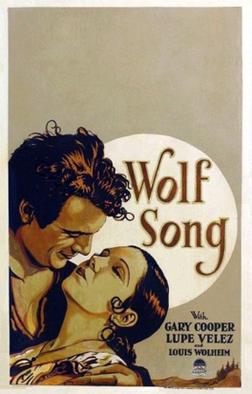
Wolf Song is a 1929 American sound part-talkie Western romance film directed by Victor Fleming and starring Gary Cooper and Lupe Vélez. While the film has a few sequences with dialog, the majority of the film featured a synchronized musical score with sound effects using both the sound-on-disc and sound-on-film process.

The Battle of the Sexes is a 1928 American sound comedy film directed by D. W. Griffith. While the film has no audible dialog, it was released with a synchronized musical score, singing and sound effects using both the sound-on-disc and sound-on-film process. The film starred Jean Hersholt, Phyllis Haver, Belle Bennett, Don Alvarado, and Sally O'Neil. It was released by United Artists. The film was a remake by Griffith of an earlier film he directed in 1914, which starred Lillian Gish. Both films are based on the novel The Single Standard by Daniel Carson Goodman; the story was adapted for this production by Gerrit J. Lloyd.

Piccadilly Incident is a 1946 British drama film directed by Herbert Wilcox and starring Anna Neagle, Michael Wilding, Coral Browne, Edward Rigby and Leslie Dwyer.

The Flying Squad, also known as Edgar Wallace's The Flying Squad is a 1940 British crime film directed by Herbert Brenon and starring Sebastian Shaw, Phyllis Brooks and Jack Hawkins. It was based on a 1928 novel by Edgar Wallace, which had been previously filmed under the same title in 1929 (silent) and1932.

River Beat is a 1954 British second feature noir crime film directed by Guy Green and starring John Bentley, Phyllis Kirk and Leonard White. It was distributed in the United States by Lippert Pictures.

Hammer the Toff is a 1952 British second feature crime film directed by Maclean Rogers and starring John Bentley and Patricia Dainton. The film was based on the 1947 novel of the same name by John Creasey, the 17th in the series featuring upper-class sleuth Richard Rollinson, also known as "The Toff".

Frozen Justice is a 1929 American pre-Code drama film directed by Allan Dwan. The picture starred Lenore Ulric in her first sound film and is based on the 1920 novel, Norden For Lov og Ret, by Ejnar Mikkelsen. A shorter, silent version of the film was also released. The film was set in Nome, Alaska during the Klondike Gold Rush in 1898 and 1899.
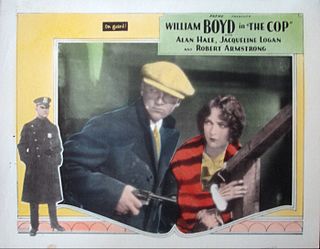
The Cop is a 1928 American silent drama film directed by Donald Crisp. Due to the public apathy towards silent films, a sound version was also prepared. While the sound version has no audible dialog, it was released with a synchronized musical score with sound effects using both the sound-on-disc and sound-on-film process. At the 2nd Academy Awards in 1930, Elliott J. Clawson was nominated for an Academy Award in the category Best Writing. Prints of the film exist in several film archives including the Library of Congress.

Sal of Singapore is a 1928 American sound part-talkie drama film directed by Howard Higgin. In addition to sequences with audible dialogue or talking sequences, the film features a synchronized musical score and sound effects along with English intertitles. The film's sets were designed by the art director Edward C. Jewell. Complete prints of the film exist.

Shady Lady is a 1945 romantic comedy directed by George Waggner and starring Charles Coburn, Robert Paige, and Ginny Simms. Waggner originally wanted Susanna Foster for the film but she refused it. Ginny Simms sings floor show songs "Cuddle Up a Little Closer", "In Love With Love" and "Xango".
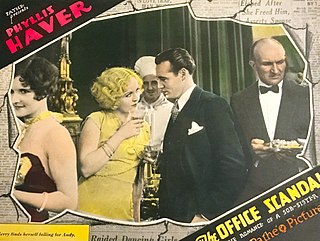
The Office Scandal is a 1929 American sound part-talkie drama film directed by Paul L. Stein and starring Phyllis Haver, Raymond Hatton and Margaret Livingston. In addition to sequences with audible dialogue or talking sequences, the film features a synchronized musical score and sound effects along with English intertitles. The soundtrack was recorded using the RCA Photophone sound-on-film system.

The Common Law is a 1923 American silent drama film directed by George Archainbaud and starring Corinne Griffith and Conway Tearle. Based upon the novel of the same name by Robert William Chambers, the film was produced and released by Selznick Pictures Corporation.

No Control is a 1927 American silent comedy film directed by Scott Sidney and starring Harrison Ford, Phyllis Haver and Jack Duffy. Due to the public apathy towards silent films, a sound version was also prepared in 1928. While the sound version has no audible dialog, it was released with a synchronized musical score with sound effects using both the sound-on-disc and sound-on-film process.

The Nervous Wreck is a 1926 American silent comedy adventure film directed by Scott Sidney and starring Harrison Ford, Phyllis Haver and Chester Conklin. It is based on the play The Nervous Wreck by Owen Davis, inspired by an earlier story The Wreck by E.J. Rath. The play later became a musical on which the 1930 film Whoopee! was based and also inspired the 1944 film Up in Arms.




















